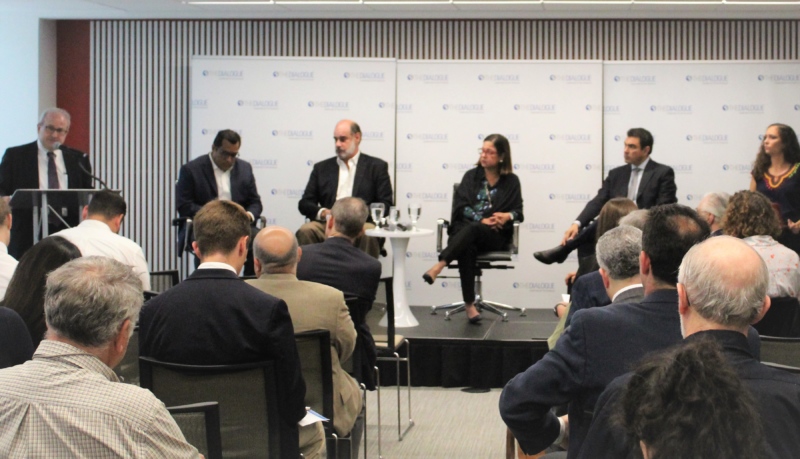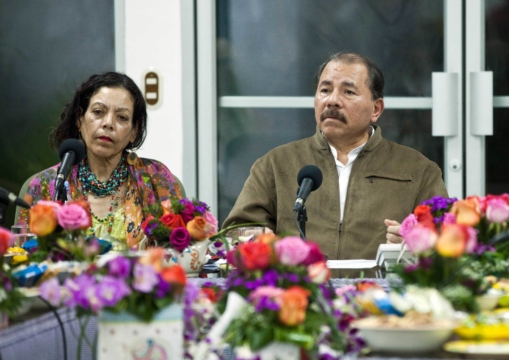A Fatal Blow to Democracy
Nicaragua is on the precipice.
On May 30, the Inter-American Dialogue hosted the event “A Year of Protests and Uncertain Negotiations: Where is Nicaragua headed?” The event was moderated by Manuel Orozco, director of the Migration, Remittances, and Development program at the Inter-American Dialogue. The panelists were Mónica López Baltodano, activist and attorney for the Organization of Social Movements and Civil Society, Félix Maradiaga, director of the Institute of Strategic Studies and Public Policy, Michael Healy, president of the Union of Agricultural Producers of Nicaragua, and Violeta Granera, director of the Broad Front for Democracy.
The discussion began by noting that although Washington’s attention is currently focused on Venezuela, we should not forget about the political and humanitarian crisis happening in Nicaragua. Michael Shifter, president of the Dialogue, affirmed the Dialogue’s continued commitment to finding solutions that will guide Nicaragua out of the crisis.
The event was held as a part of the Dialogue’s work on the political crisis in Nicaragua, focused on reestablishing democracy and protecting human rights in the nation. These efforts have included a series of meetings of a working group comprised of Nicaragua’s non-governmental sectors, including leaders from the private sector, union representatives, and activists working towards solutions to the crisis. The panelists are part of this working group, and represent organizations that are a part of the Blue and White National Union (UNAB). The event was an opportunity to share the results of private discussions the group has been holding, some of which have also included other partners.
The panelists underlined the Nicaraguan government’s failure to comply with agreements negotiated by the Civic Alliance for Justice and Democracy, which is part of UNAB. “Each day that the Ortega regime fails to comply with these agreements is another day the political prisoners spend incarcerated,” Orozco reiterated, emphasizing the importance of finding a consensus within an opposition that represents a diverse set of perspectives, which has been a historical challenge for the movement. Finding this consensus is a critical step towards reaching the balance of power necessary for democratic elections, as well as for solidifying the role of the opposition in the eyes of the international community.
A key topic in the discussion was the non-violent nature of the opposition, which Maradiaga noted is a break from the strategies historically employed for political change in the country. The fact that the Ortega regime has used such force to repress an unarmed public is part of what makes the regime “the most hateful dictatorship” Nicaragua has had, according to Granera. The panelists reaffirmed the opposition’s commitment to non-violence, but also noted the need for support from the international community to ensure that this non-violence will be successful in bringing about the goals of democracy, justice, and liberty.
In addition to a democratic crisis, Nicaragua is falling into a deep economic crisis, Healy noted. Although Ortega has blamed the opposition for this economic crisis, Healy asserted that the crisis has been caused by Ortega’s policies. These policies have led to a rise in unemployment, and have left the productive sector unable to support small-scale producers and unable to compete as exporters. Without prompt political reforms, Healy ensured that the Nicaraguan economy is headed down the path towards what he called “venezuelization.”
López and Granera commented on the importance of having a diverse opposition that will attract the support necessary not only to end the Ortega regime, but also to build a new Nicaragua. This new Nicaragua, said Granera, cannot be a democracy only in the electoral sense. What Nicaragua needs, she argued, is “a model of democracy that is political, social, and economic.” Realizing this goal requires open conversation, a search for consensus, and empathy, and Granera stated that the working group facilitated by the Dialogue has provided a space in which to begin such conversations.
The panelists reaffirmed the commitment of the working group, and of UNAB, to work towards building a new Nicaragua free of the human rights violations of the Ortega regime. They also reiterated the importance of international support for achieving this goal.
Nicaragua is on the precipice.
What will Ortega’s landslide victory allow him to do in his next term?
Strongman Daniel Ortega is running for a third term (with his wife as VP) and cravenly removing all checks on his power. Sound familiar?
 Elizabeth Belair / Inter-American Dialogue
Elizabeth Belair / Inter-American Dialogue
